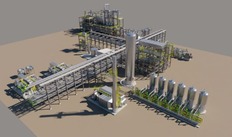- Zaragoza will invest €280M in a new waste treatment plant to achieve zero waste and emissions by 2030.
- The first phase (2023-2028) will cost €188.1M and aims to reduce landfill waste by half.
- The second phase will cost €91.4M and focus on producing green hydrogen and E-methanol.
- The plant will convert waste into hydrogen and methanol, saving nearly 190,000 tons of CO2eq annually.

Project Overview
Zaragoza City Council is investing €280 million in a new waste treatment plant to achieve zero waste to landfill and zero emissions by 2030. This plant will complement the existing Waste Treatment Complex (CTRUZ) and transform non-recyclable waste into valuable elements like hydrogen and methanol.
Phase 1: Zero Waste to Landfill (2023-2028)
The first phase, costing €188.1 million, involves constructing a Non-Recyclable Waste Refinery capable of treating 150,000 tons of waste annually. The OMNI200 system will convert waste into synthesis gas, producing 66,000 tons of methanol per year and saving nearly 100,000 tons of CO2eq annually. The first treatment line is expected to be operational by late 2026, reducing landfill waste by half. The second line will start in 2028, further reducing methane emissions and CO2eq by around 90,000 tons annually.
Phase 2: Zero Net Emissions by 2030
The second phase, with an investment of €91.4 million, aims to make Zaragoza a hub for green hydrogen production. The Waste Refinery will require 14,000 tons of green hydrogen to produce 70,000 tons of E-methanol from captured CO2, achieving a zero carbon footprint for the methanol produced. This phase will help meet the zero net emissions target by 2030.
Economic and Environmental Impact
The project promises significant long-term economic savings by reducing landfill costs and generating revenue from the sale of hydrogen and methanol. The total investment will be self-financed through these sales and supported by European funds. When fully operational, Zaragoza will be the first city globally to achieve zero waste to landfill and zero emissions from waste management, all at no additional cost beyond current expenses.

